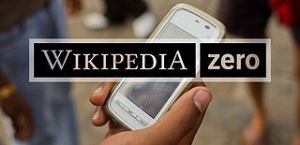Several months ago I learned that Wikipedia Zero was nominated as a finalist for the SXSW 2013 Interactive Awards. I was obviously thrilled, since we were one of only five projects to receive this honor in the Education category. We’ve always thought of Wikipedia as an educational resource, because learning starts by providing people with knowledge and it was great to be recognized for that.

My thinking changed earlier this year when I got an email from Andrew A. McNeill, the Festival Coordinator at SXSW Interactive. He asked what I thought about switching award categories from Education to Activism. I was initially surprised by the suggestion. We focus on knowledge and education, right? Isn’t that what Wikipedia’s all about? I was so mired in day-to-day operations I never had the chance to reflect back on what we were really doing.
Activism? Really? I just had my head down, along with the rest of my team, moving our work along and doing what needed to be done.
But getting this program up and running was no easy task. We rely heavily on partners to eliminate the data cost to users to access Wikipedia on mobile devices. This involves weeks, if not months, of negotiations with mobile operators, along with various technical changes to make the program a reality. We had to educate everyone we work with about what Wikipedia is and isn’t: we do not and will not filter or censor content, and the site is maintained and improved by the community of volunteer contributors. There is no up-sell or compelling business proposition that we can really offer. This is about changing the mindset of partners, and ultimately users and the entire public. We’re working to convince people that everyone on the planet should have access to free knowledge, that this should be a fundamental human right.
That’s when I realized we weren’t just selling a program, we’re trying to shift a paradigm. In order to fulfill our mission, we had to change the way people thought about what’s important in life. We really were activists. I didn’t realize that because this is just what we needed to do.
True activism, however, must be driven at the grass-roots level and we’re beginning to see that develop. People are demanding free access to knowledge, but we need to see much more of it. Much more.
In some ways, Wikipedia Zero is different from what we’ve done in the past at the Wikimedia Foundation. Wikipedia and its sisters sites are the number five most visited website in the world (comScore Mediamatrix), and we’ve experienced phenomenal growth. However, we have never spent any resources on marketing, SEO, or other web traffic driving techniques. It has all been organic growth.
Wikipedia Zero, however, is about reaching the people who need access to knowledge and who aren’t getting it. Therefore, we have to proactively get to users, which is something we hadn’t done before. It takes enormous time, effort and will-power; it is a tremendous task to reach people in the developing world who face barriers such as cost, poor infrastructure, low-end mobile phones that aren’t data-enabled, and even those who are illiterate. We also have to invest in campaigns that drive awareness and understanding of Wikipedia, because we are trying to reach people that have had little or no exposure to it’s benefits.
I’m happy to say we are making great inroads. Wikipedia Zero is now available to 330 million mobile users around the world and we’ll be announcing more partnerships soon. We are honored that Wikipedia Zero won at SXSW and we appreciate the validation the award conveys to our efforts. But this is only the beginning. Activism is step one. Next stop, accelerating this program so it becomes a movement to benefit all of humankind.
As I said in our acceptance speech, “Thank you for keeping knowledge free,” and we need to continue to do that. Lobby your mobile operator and your government. Tell your friends. Help us make free knowledge accessible to everyone.
Kul Takanao Wadhwa, Head of Mobile, Wikimedia Foundation

Can you help us translate this article?
In order for this article to reach as many people as possible we would like your help. Can you translate this article to get the message out?
Start translation